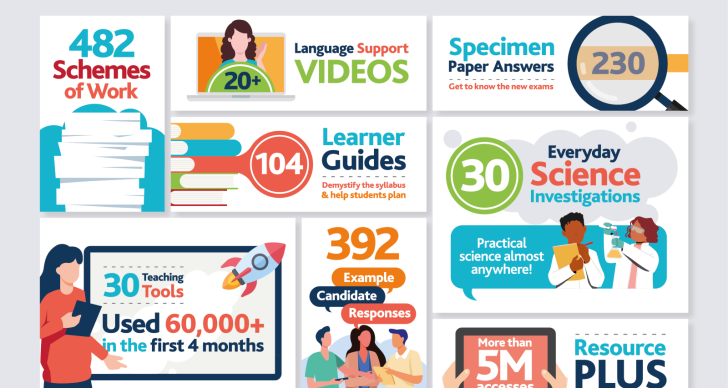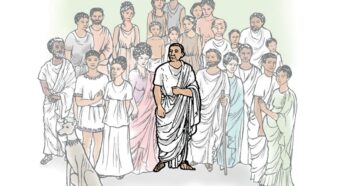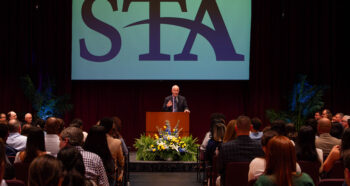In the past year, our Curriculum Support team has made strides in providing new and improved teaching and learning support to Cambridge schools around the world.
Here are some of the highlights from 2023:
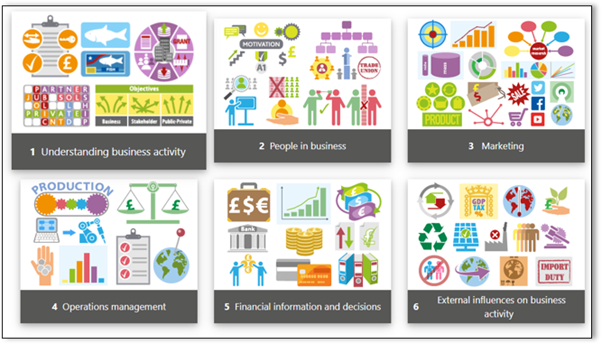
1. Resource Plus helps Cambridge teachers deliver high quality teaching programmes, through the provision of lesson plans and multimedia resources and other materials that enable teachers to teach some of the more challenging topics and skills to students. Resource Plus is available for more than 20 key syllabuses across Science, Mathematics, English and Business through the Cambridge School Support Hub. Some of the resources include virtual science experiments, animated introductions to set texts, lesson slides and interactive mathematical tools, videos introducing speaking and listening skills, and animated business case studies.
Each Resource Plus includes learner materials which teachers can assign to their students to support remote learning as well as traditional in class activities. As the pandemic took hold in March 2020, the scalable Resource Plus platform handled over 1.3 million access, and thousands of users continue to use Resource Plus every month.
New Resource Plus products have been released for AS&A Level and IGCSE Marine Science, and updates to other syllabuses are now available.
Find out more about Resource Plus
2. Everyday Science complements the lab science skills developed by Resource Plus for science syllabuses, by helping learners carry out scientific investigations using everyday materials that are readily available in their homes or local area. Using a reflective approach to learning, learners are guided through simple, yet engaging science investigations that help develop practical science skills like planning, observation and recording, analysing and interpreting results, which meet the needs of A03 Experimental Skills and investigations.
Learners develop a personalised learning journal, as they complete activities related to the investigation, which can be shared with their teacher as a homework activity, or in preparation for follow on lab work. Everyday Science works on any internet-capable device, and is available across a range of Cambridge IGCSEs, O Levels and Cambridge International AS&A level science syllabuses.
Find out more about Everyday Science
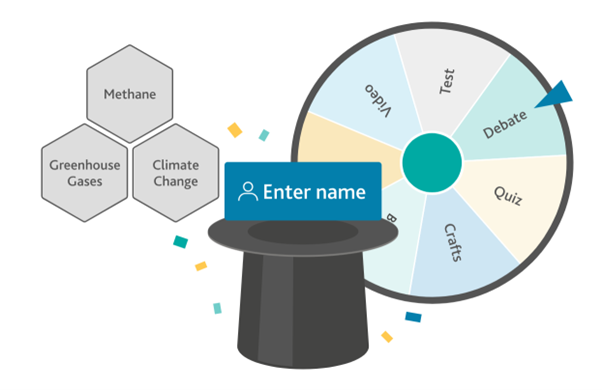
3. Teaching tools allow teachers to create quick classroom activities – including random name selectors, drag and drops, activity choosers, starter challenges, timers, and integrate them seamlessly within their lessons. They are tools that encourage the effective use of technology for teaching and learning without any technical pressures, they just work. The tools are based on Cambridge pedagogical approaches, and focus on learning rather than technology, helping teachers to deliver engaging lessons with minimal fuss. Developed as part of research and collaboration with Cambridge teachers, the tools have been used by over 60,000 teachers since their launch in June 2023. Available at no additional charge through the School Support Hub.
We aim to release further tools in the future, continuing to listen and respond to teacher feedback and requests.
“চমৎকার !” [Excellent]
“Make the lesson fun”
“…there is a great variety”
“Excellent interactive tools”
“Love this!”
“Fantastic!”
“Very practical and useful within the context of what needs to be taught – helping the teaching – rather than tech that forces the agenda for the teaching around the tech itself.”
Watch this video on Teaching Tools
4. Scope and Sequence
We are currently reimagining how support is presented to teachers to enable them to find the right support quickly and integrate it into their teaching programmes with minimum effort. We aim to give time-poor teachers direct access to exactly the content or service they require at their time of need. To do this we are looking at how information is presented on our School Support Hub – we hope to have revised presentation and functionality available.

5. Skills Exercises are designed to help teachers bring metacognitive strategies into the classroom. We developed them after teachers asked for more support around the application of analysis and evaluation skills. Skills Exercises are more about the application of knowledge rather than the acquisition of knowledge and are organised using an assessment objective-based approach, rather than by component or paper.
For example, the Skills Exercises resource for Cambridge International AS & A Level Sociology 9699, AO2 interpretation and application, includes activities on how to explain and linking concepts to theories.
Each Skills Exercises resource includes topic specific exercises with suggested classroom activities and teaching approaches. There are worksheets and answer sheets for each activity which can either be printed for learners or displayed on an interactive board to complete as a class. The worksheets can also be adapted to suit your learners’ needs and your specific context of learning.
The exercise and worksheet format, empowers teachers to use them for multiple purposes, including formative assessment, revision tasks, in the classroom or as an extension activity to challenge learners. Skills Exercises are also designed to support differentiation in the classroom; for example, learners can complete different activities for different assessment objectives at the same time, depending upon their needs. The worksheets are also designed around active learning and dialogic discussion, so working in a variety of ways, including independently, in pairs and small groups is encouraged as is peer assessment and whole class discussion to ensure a complete understanding of the skill.
You can find Skills Exercises for over 11 key syllabuses on the School Support Hub. We have just released a new AS & A Level Psychology and IGCSE / O Level Economics. We aim to develop further Skills Exercises to support our Cambridge syllabuses by July 2024. You can also watch the Guidance for Skills Exercises video also available on the School Support Hub that provides examples of how to use the Skills Exercises.
Watch the video below
6. Speaking test support has been a focus over the last year. Cambridge speaking test resources ensure that teachers and learners feel fully prepared for their speaking tests. We have a range of support available which gives guidance on preparing for, delivering, and performing in the tests.
1. The Speaking Test Video specifically supports the teacher in their role as teacher/examiner in how to conduct the speaking tests. The video provides information about the structure of the test, and what is required before, during and after the speaking test. It is a clear and informative combination of an animated explanation and includes a demonstration of the test.
2. Specimen Speaking Tests are syllabus specific and include full length videos of speaking tests. Included are full transcripts, moderator comments and guidance, and marks. These videos focus on the strengths and weaknesses of the performance of both the candidates and teacher/examiners.
3. Example Candidate Responses include audio recordings submitted for the first live examination series for a syllabus. The recordings demonstrate how real candidate and teacher/examiner performance relate to the mark scheme and assessment criteria, and include moderator comments that explain where and why marks were awarded. A list of common mistakes highlights general mistakes that were typically made by candidates and teacher/examiners during that examination series.
For the candidate, success in a Speaking test relies on many things but predominantly the candidate’s preparation BEFORE the test and their performance DURING the test. However, the teacher has a very important role as teacher/examiner, which should not be underestimated.
We encourage all teachers to engage with these resources in preparing the learners and themselves for the Cambridge speaking tests. We expect teachers to share the videos and audios with learners as a classroom resource for discussions and roleplay activities.
The more opportunity to practise, the more confident you and your learners will be in the real examination, which will then lead to successful results.
Please visit our School Support Hub (Teaching and learning tab) to access all our support resources on this blog.


